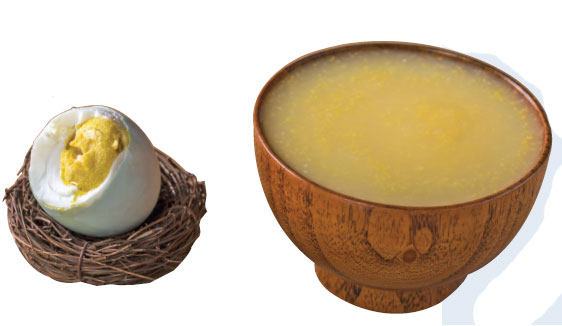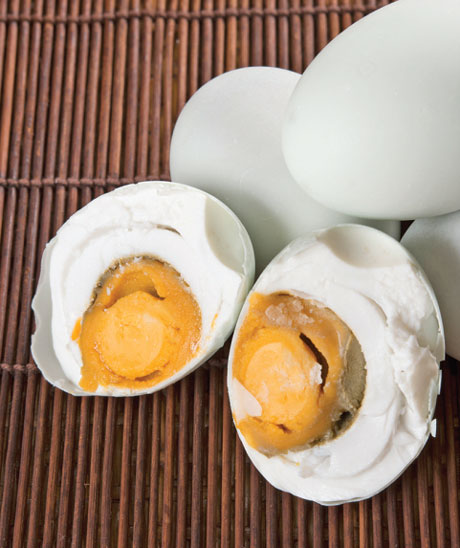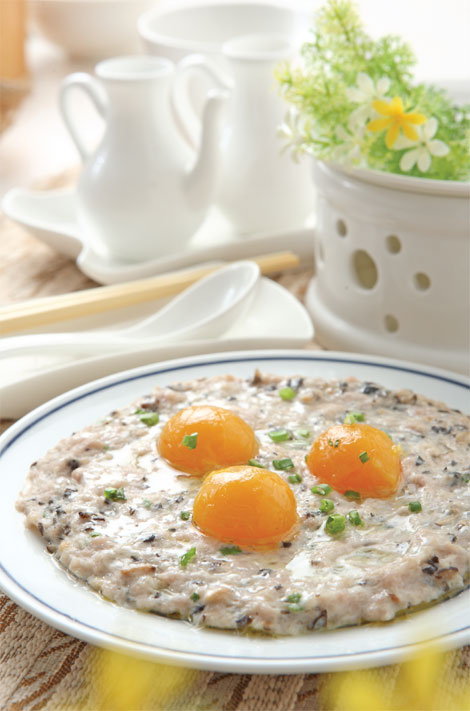Heaven in a shell

Editor's note: To understand China, sit down to eat. Food is the indestructible bond that holds the whole social fabric together and it is also one of the last strong visages of community and culture.
Salted eggs. The simplest accompaniment to a bowl of white rice porridge. It used to be the lowliest of foods, a treat for the poor who could not afford meat.
If rural families in China kept chickens and ducks, it was almost always for the eggs. Killing the chicken or duck was a rare luxury reserved for truly festive occasions. Salting the eggs kept them edible long after their sell-by dates.
| A Steamed patty topped by salted egg yolks. Photos by Chai Shijue / For China Daily |
Salted eggs are eaten everywhere in China, and wherever the Chinese have gone in the world these delicious pickled eggs have followed.
They are used as condiments, side dishes and major attractions on the dining table. My first encounter with them was memorable.
When I was a child, my grandfather often had simple suppers at midnight. Our nanny would have ready a pot of porridge on the stove, and under the muslin food cover on the marble table would be little platters of salted eggs, preserved radishes and, sometimes, crisply fried whitebait.
Since my crib was in his room, I would clamber down and trot after him into the kitchen like an eager puppy. He would hoist me up on the chair next to him and I would watch while he heated up the porridge.
My grandpa was an emigrant from Fujian province, a self-made tycoon who had worked his way up from a penniless coolie. He still hankered after the food of his childhood - rice porridge with chunks of sweet potato and salty wedges of duck eggs.
When the porridge had heated up, he would start his supper. As he ate his porridge, my eyes would follow him. The salted eggs would always be cut into quarters, shell and all, and he would scoop out the egg, dropping the salty whites into his bowl.
More often than not, he would pick up the orange yolk, gleaming with oil, and drop it into my mouth.
I never forgot the taste. The natural fat in the yolk had rendered during cooking and seeped out. Yet the texture was both creamy and sandy at the same time. That's the simplest way to eat salted eggs.
Cantonese cooks have a way of using them to enhance equally humble ingredients, such as minced pork from cheap cuts of meat.
Using nothing more than the salted egg white to bind the meat, they produce a steamed patty topped by a flattened egg yolk, creating a dish that is economical, attractive and pretty tasty.
Salted eggs can also be used in vegetable soups, with the egg white beaten into froth before being dropped into the hot broth. The yolks would be cut up, and they float on the bed of green and white like little, yellow nuggets.
In recent years, innovative chefs have created dishes using the natural umami of the salted egg yolks. After steaming, the yolks are crushed and added to hot butter or oil to form a foaming golden sauce that is used to coat everything from fried prawns and crabs to chicken and gluten balls.
Curiously enough, that great divide between north and south in China comes into play even with this simple ingredient.
In the north, salted duck eggs are almost always sold cooked and ready to eat. Only professional kitchens have access to uncooked eggs.
In the south, vendors would never dream of selling cooked eggs preferring to let customers have their own flexibility.
The best salted eggs in China must be from Gaoyou, a city in Zhejiang province. If the egg yolk is the highlight of a salted duck egg, then an egg with two yolks must be the ultimate product.
Gaoyou is famous for its ducks, a speckled species that consistently produces eggs with multiple yolks. It's like having the genes for twins. In fact, breeding ducks and making salted eggs earned Gaoyou an intangible national heritage award. Historical archives say the city's famous eggs were already sent as tribute to the imperial courts during the time of Emperor Qianlong of the Qing Dynasty (1644-1911). He was, of course, a well-known foodie.
He wasn't the first to appreciate them. Another food lover, Song Dynasty (960-1279) poet Su Dongpo, also loved them and often sent for Gaoyou salted eggs when he was governor of nearby Hangzhou.
So apart from that twin gene in the ducks, what makes their eggs so good? I've seen them on one fleeting visit to the city and the ducks are huge, bred free-range on the natural rivers and lakes, and they feed on the shrimp and fish that are abundant there.
You just cannot beat nature.
paulined@chinadaily.com.cn

Making salted eggs
It's actually simple, so if you want to try the recipe, here it is. (But a word of advice: Chicken eggs work well, but the sanitized breeding programs these days mean the yolks have less fat, which means you won't get that oily effect.)
10 duck or chicken eggs
Chinese white spirit or vodka
1 kg of salt (rock or rough sea salt best)
1.5 liters of water
Prepare the eggs by wiping them clean with a damp cloth. Don't be lazy and try to wash the dried dirt off. You don't want to risk contamination if the eggs absorb the water and so you must remember which end of the duck they came from. Sterilize the eggs by wiping the shells with Chinese white spirit or vodka.
Try to dissolve as much salt in the water as you can. Once the brine reaches saturation point, the salt crystals will no longer melt. You can place the brine over a low heat to help the salt dissolve faster.
Prepare a glass pickling jar or a large container with a tight lid. Pour the brine in halfway and slowly place the eggs gently in. Once all the eggs are in, top up the brine until the eggs are covered.
To keep the eggs down, fill a ziplock bag with ice and place on top of the eggs. The ice will melt, but the volume of the water will still keep the eggs submerged.
The next ingredient is patience. From my experience, you need to wait at least 20 days to a month, or more if you want them well salted. The proof of a well-salted egg is a perfectly round, hardened yolk when you break the egg into a saucer.

(China Daily European Weekly 09/30/2016 page18)
Today's Top News
- Japan PM's remarks on Taiwan send severely wrong signal
- Key steps to boost RMB's intl standing highlighted
- Sustained fight against corruption urged
- Xi calls for promotion of spirit of volunteerism
- Xi calls for promoting volunteer spirit to serve national rejuvenation
- Xi chairs CPC meeting to review report on central discipline inspection































